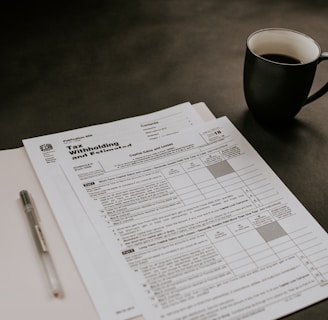What You Need to Know About Tax-Efficient Investing


INTRODUCTION
When it comes to building wealth and securing your financial future, most people focus on the obvious factors: choosing the right investments, understanding risk, and diversifying their portfolio. While these are all essential elements of a sound financial strategy, there’s another critical component that often gets overlooked — tax-efficient investing.
Tax-efficient investing is not about avoiding taxes altogether. Rather, it’s about structuring your investment strategy in a way that legally minimizes the taxes you pay, allowing you to keep more of your hard-earned returns. Over time, the impact of taxes on your investment portfolio can be significant. Without a clear strategy for tax efficiency, you might unknowingly reduce your overall wealth potential.
In this blog, we’ll break down what tax-efficient investing means, why it matters, and practical strategies you can apply to help maximize your after-tax returns.
What is Tax-Efficient Investing?
Tax-efficient investing involves selecting and managing your investments in a way that reduces the amount of taxes you owe. This means being intentional about where you place different types of assets, how frequently you trade, and which accounts you use for certain investments. It’s important to remember that taxes can significantly erode your investment returns over time. By taking a tax-conscious approach, you can reduce these costs and help your portfolio grow more efficiently.
Why Tax Efficiency Matters
Every time you earn interest, dividends, or capital gains from your investments, you may owe taxes. The more taxes you pay, the less money stays in your portfolio, potentially slowing down your progress toward long-term financial goals like retirement, purchasing a home, or funding your child’s education. Consider this: two investors could have identical investment returns, but the one who implements tax-efficient strategies may end up with significantly more wealth over time simply because they paid less in taxes.
In short, tax-efficient investing helps:
Maximize your after-tax returns
Preserve your wealth
Improve your long-term investment performance
Keep more of what you earn
Key Tax-Efficient Investing Strategies
Tax-efficient investing doesn’t require complex maneuvers or risky decisions. With careful planning and awareness, you can incorporate several proven strategies into your financial approach.
1. Utilize Tax-Advantaged Accounts
One of the simplest ways to improve tax efficiency is by using tax-advantaged accounts for your investments. These include:
Retirement Accounts: 401(k)s, IRAs, and Roth IRAs offer tax-deferred or tax-free growth. Contributions to traditional 401(k)s or IRAs may reduce your taxable income, while Roth IRAs grow tax-free, and qualified withdrawals are tax-free.
Health Savings Accounts (HSAs): For those with high-deductible health plans, HSAs provide triple tax benefits — tax-deductible contributions, tax-free growth, and tax-free withdrawals for qualified medical expenses.
529 Plans: These education savings plans offer tax-free growth and tax-free withdrawals for qualified education expenses.
By placing appropriate investments within these accounts, you can shelter your returns from taxation and improve your overall efficiency.
2. Asset Location Optimization
Different types of investments produce different types of income, which are taxed differently. A smart tax-efficient strategy involves placing your investments in accounts that align with their tax treatment:
Tax-inefficient assets (such as bonds, actively managed funds, and high-dividend stocks) are best held in tax-advantaged accounts where their income can grow without immediate tax consequences.
Tax-efficient assets (such as index funds, ETFs, and growth stocks that produce minimal income) are better suited for taxable brokerage accounts.
This approach ensures you’re minimizing taxes based on the characteristics of each investment.
3. Minimize Turnover and Trading
Frequent trading can generate short-term capital gains, which are typically taxed at higher rates than long-term gains. To avoid this, consider:
Choosing low-turnover investments like index funds and ETFs
Holding investments for more than one year to qualify for lower long-term capital gains tax rates
Avoiding unnecessary buying and selling that triggers taxable events
A buy-and-hold strategy not only reduces taxes but also promotes long-term growth potential.
4. Harvest Tax Losses
Tax-loss harvesting is a strategy where you sell investments that have declined in value to offset gains from other investments. By doing this, you can reduce your taxable capital gains and even offset up to $3,000 of ordinary income annually. However, it’s important to follow IRS rules, including avoiding “wash sales,” where you repurchase the same or a substantially identical security within 30 days of the sale. When done properly, tax-loss harvesting can be a valuable tool for improving tax efficiency, particularly in volatile markets.
5. Be Strategic with Withdrawals
In retirement, the order in which you withdraw funds from different accounts can significantly affect your tax bill. A thoughtful withdrawal strategy might involve:
Withdrawing from taxable accounts first to allow tax-advantaged accounts to continue growing
Coordinating Roth IRA withdrawals for later years to minimize taxable income
Considering required minimum distributions (RMDs) from traditional IRAs or 401(k)s at age 73 (for most retirees)
A financial planner can help you develop a withdrawal plan that minimizes taxes while meeting your income needs.
6. Choose Tax-Efficient Investments
Certain investments are inherently more tax-friendly than others. Examples include:
Index funds and ETFs: These funds tend to have low turnover, resulting in fewer taxable events.
Municipal bonds: Interest from municipal bonds is often exempt from federal and sometimes state taxes.
Growth-focused stocks: These stocks may not pay dividends, allowing you to defer taxes until you sell them.
Choosing the right mix of tax-efficient investments can complement your overall tax strategy.
Common Mistakes to Avoid
While tax-efficient investing offers many benefits, it’s essential to avoid some common pitfalls:
Focusing solely on taxes at the expense of proper diversification
Making investment decisions based only on tax considerations rather than overall portfolio health
Ignoring the impact of taxes when planning withdrawals in retirement
Failing to consult with a qualified financial advisor or tax professional
A balanced approach that combines smart investment choices with tax awareness yields the best long-term results.
The Role of a Financial Advisor in Tax-Efficient Investing
Navigating the world of tax-efficient investing can be complex, especially as your financial situation becomes more sophisticated. A financial advisor can help you:
Identify tax-saving opportunities specific to your circumstances
Optimize the location of your assets across different accounts
Implement a personalized investment strategy that balances risk, returns, and tax efficiency
Coordinate with tax professionals to ensure your investment and tax strategies work together
By working with a trusted advisor, you can avoid costly mistakes and ensure your wealth-building efforts are as tax-efficient as possible.
Final Thoughts
Tax-efficient investing is one of the most powerful, yet often overlooked, strategies for growing and preserving wealth. By understanding how taxes affect your investment returns and implementing thoughtful strategies to minimize them, you can keep more of what you earn and accelerate your progress toward your financial goals. Whether you are a seasoned investor or just getting started, incorporating tax efficiency into your investment plan is essential for maximizing long-term success. With careful planning and professional guidance, you can take control of your financial future while minimizing the drag of unnecessary taxes. If you are ready to explore how tax-efficient investing can benefit you, consider speaking with a qualified financial advisor to create a plan tailored to your unique needs.


